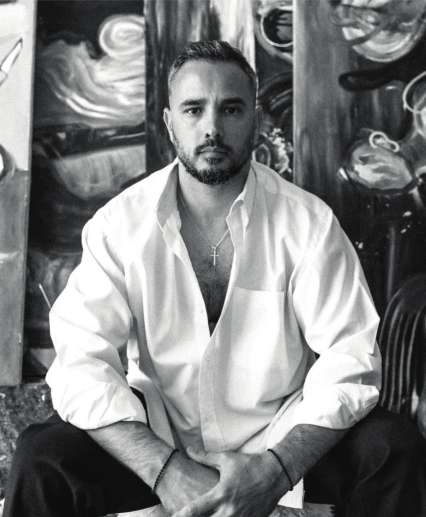Iulian Giurca, born in December 1979 in Bârlad, Romania, is an artist known for exploring religious and moral narratives through evocative paintings. Raised during the communist dictatorship, he developed a passion for art and religion early on. Giurca studied Plastic Arts in Iasi, Romania, where his work was influenced by life under an oppressive regime.
In 2002, Giurca moved to France and earned a degree in visual communication from Nice Sophia-Antipolis University. This training enriched his artistic approach, blending traditional Orthodox themes with contemporary techniques.
His paintings often depict human frailty, sin, and the struggle for redemption, drawing on Orthodox influences like angelic and demonic figures.
Giurca’s early works feature starkly lit, symbolic spaces reflecting battles between good and evil. His art evolved to address broader themes of sin and human salvation, incorporating surrealism and abstraction. Recent works focus on societal conflicts, using gritty imagery to translate his style into three-dimensional forms, exploring identity, transformation, and the human condition.
His expressive, surreal compositions blend human and non-human features, critiquing contemporary society through chaotic, vivid imagery.
Giurca’s dynamic and fluid painting style, with complex and chaotic compositions, provokes a strong emotional response, challenging viewers with intense and thought-provoking visuals.
Recurring motifs such as horns, skeletal structures, and fragmented body parts suggest themes of dehumanization and metamorphosis, offering a critique of contemporary society. The surreal, dreamlike imagery blurs the line between reality and fantasy, provoking a strong emotional response from the viewer.
Overall, these powerful and thought-provoking artworks utilize chaos and distortion to explore complex themes, challenging and engaging the viewer with their raw intensity and vivid, unsettling visuals.

Iulian Giurca
b. 1979 Bârlad, Romania